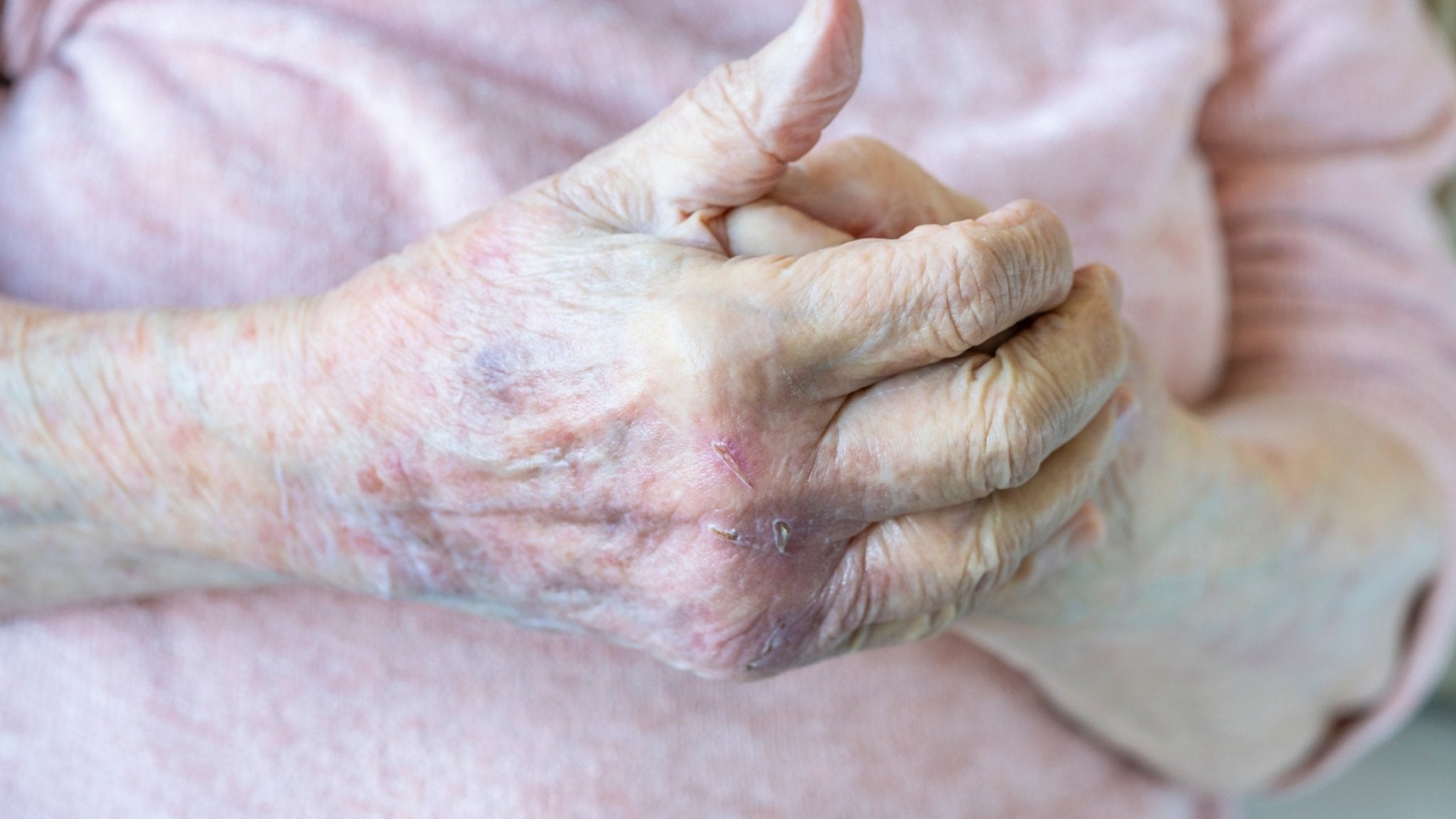Eczema, a chronic skin condition also known as atopic dermatitis, affects people of all ages. While this itchy condition is commonly associated with children, it can also develop in adulthood and later in life. Adult-onset eczema in people over age 50 often occurs because of the natural aging process. Here’s a breakdown to help you understand the causes, symptoms, and treatments for eczema in older adults.
Causes
Can you get eczema as you get older? The answer is yes! What triggers eczema in the elderly is largely the same as what triggers eczema in other age groups, including genetic predisposition, environmental factors, a compromised skin barrier, and a microbiome imbalance. Aging can also play a role in the development of eczema. Sudden eczema in older adults may be due to hormonal changes associated with aging, reduced skin elasticity, thinning of the epidermis, and impaired moisture retention, all of which make the skin more susceptible to irritants and allergens.
Types of Eczema
Older adults can develop any of the seven types of eczema. Atopic dermatitis in people over ages 60 can be referred to as “senile atopic dermatitis” or “elderly atopic dermatitis.” Asteatotic eczema and status dermatitis are two types of eczema that are most common in seniors and the elderly.
Asteatotic Eczema
Asteatotic eczema is a common form of dry, itchy eczema that occurs primarily in geriatric populations. It’s also known as eczema craquelé because of its cracked appearance. Asteatotic eczema occurs primarily on the shins, but it can also occur on other parts of the body, including the arms and trunk. Elderly people often experience asteatotic eczema during the winter months when their skin is particularly dehydrated.
Stasis Dermatitis
Stasis dermatitis, also known as venous eczema, varicose eczema, and gravitational dermatitis, occurs when the skin on the lower legs swells and becomes itchy and inflamed due to poor circulation. It’s most likely to occur in the elderly and in people who have high blood pressure, deep vein thrombosis, or varicose veins.
Symptoms
Eczema symptoms can be more severe in elderly people and the skin can take longer to heal. Common symptoms include:
Dry Skin
As we age, our skin produces less sebum, and our skin barrier loses its ability to retain water. This creates dry skin, also known as xerosis, which is extremely common in the elderly and impacts up to 50% of older adults.
Increased Itch
Eczema and xerosis are primary causes of itchy skin among the elderly. But increased itch can occur because of other factors too: systemic illnesses, drug reactions, and neurological disorders can also result in itchy skin. If you’ve noticed that your skin has gotten itchier with age, visit your dermatologist or primary care provider, who can help you figure out why you’re itchy and what you can do about it.
Wrinkles and Cracks
Our body’s natural aging process causes wrinkles and fine lines. Eczema can exacerbate these creases and create cracked and open skin that’s more susceptible to infection.
Discoloration
Eczema in mature skin can lead to patches of discoloration. Eczema may appear pink, red, gray, purple, or brown, depending on your skin tone. If you have lighter skin, your skin may appear more translucent with age, emphasizing the presence of eczema-related inflammation.
Infection and Slow Healing
Mature skin may be more vulnerable to secondary infections due to its reduced ability to repair and regenerate. Open skin from scratching can allow bacteria to enter and cause delayed healing.
Treatment
While treating eczema in seniors is similar to treating eczema in adults generally, age-related factors need to be taken into consideration. Talk to your doctor about developing a treatment plan that takes into account your particular skin symptoms, age-related skin changes, any other health conditions you’re managing, and any medications you’re taking. They’ll discuss the pros and cons of different treatments and help you develop an approach that’s right for you.
Lifestyle modifications are also part of what helps eczema in elderly people. Consider taking the following steps to ensure you’re caring for your skin and avoiding triggers that make your eczema worse.
Add Extra Moisturization to Your Routine
Mature skin requires regular moisturization to combat dryness. Emollients and rich, non-irritating moisturizers should be used daily to maintain skin hydration and restore a compromised skin barrier.
Opt for Gentle Cleansers
Harsh soaps and cleansers can further strip skin of its natural oils, exacerbating dryness and irritation. It’s best to use mild, fragrance-free cleansers that do not disrupt the skin's pH balance.
Avoid Triggers That Make Your Skin Worse
Identifying and avoiding triggers specific to your skin is crucial. Certain fabrics, temperature extremes, and allergens such as dust, pollen, and pet dander may aggravate eczema symptoms. Wearing breathable clothing and avoiding excessive heat or cold can help minimize flare-ups.
See Your Dermatologist Regularly
Regular check-ups with a dermatologist are an essential part of managing eczema in later life. Your dermatologist can evaluate your skin health, help you develop and eczema treatment plan, and address any other age-related skin concerns.
Incorporate Gladskin Into Your Routine
Supporting aging skin means opting for products that provide intensive moisturization and hydration and are formulated with your needs in mind. Consider trying Gladskin’s Eczemact™ Eczema Cream + Body Lotion Set: it contains Gladskin Eczema Cream with Micreobalance®, which restores bacterial balance to the skin microbiome as it moisturizes, and Gladskin Body Lotion, which provides 24-hour hydration to extremely dry skin.
Looking for a gentle cleanser? Try our Face Wash, Body Wash, and Shampoo Bar, which are all fragrance-free, minimally formulated, and microbiome friendly. 
Navigating Eczema Later in Life
While eczema in mature skin shares similarities with the condition in younger people, there are unique age-related aspects to consider. Understanding the causes, symptoms, and challenges specific to mature skin allows for tailored treatment plans that address your needs. With proper care and ongoing support from healthcare professionals, you can get your skin under control, allowing you to live with greater comfort and confidence.
